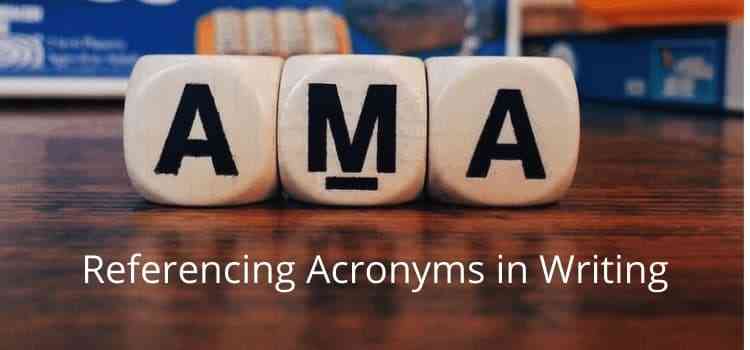
One of the basic rules every writer should follow is to reference acronyms in writing.
It applies to any form of writing. But in particular to articles, technical writing, and journalism.
Whenever you use an acronym, you should reference it in full in the first instance to avoid confusing a reader.
In the image above, the initial letters of AMA could stand for American Music Awards, Australian Medical Association, or Ask Me Anything.
How to reference acronyms in writing
When you refer to a publication manual or style guide, almost all say that whenever you use an acronym, you should define it in full the first time.
Here is what the American Psychological Association (APA) Style guide says about acronyms and abbreviations.
The first time you use an abbreviation in the text, present both the spelled-out version and the short form.
When the spelled-out version first appears in the narrative of the sentence, put the abbreviation in parentheses after it.
Use an abbreviation at least three times in a paper if you are going to use it at all.
If you won’t use it three times, then spell out the term every time. The reader might have a hard time remembering what the abbreviation means if you use it infrequently.
It’s common sense and an easy writing rule to follow.
Many sites and dictionaries on the Internet offer a listing of abbreviations and acronyms.
If you are not sure, check before you publish.
But not all writers and journalists follow the rule.
How to confuse and frustrate readers
I decided to write this article because I have recently read several news articles that don’t reference acronyms in writing.
One example was an article I read in Politico, a well-known American political news site.
The headline read: Bidens bring presidential PDA back to the White House. The acronym PDA appeared fifteen times in the article without any reference.
It wasn’t clear at all to me what the acronym stood for. When I searched for a meaning, all I came up with was a personal digital assistant.
Even from the context of the article, it wasn’t easy to ascertain what PDA meant. But stubbornly, I continued hunting until I finally interpreted that the acronym stood for personal displays of affection.
It might be a well-known acronym in some parts of the world, but it was a mystery and annoying for me.
But worse was to come
Another article not only used an acronym without a reference, but as I discovered, the acronym was, in fact, also extremely vulgar. The headline in part read: Sit back and STFU.
When I figured out the meaning and the words, the journalist could have easily written be quiet or don’t say a word.
For a respected political news site, the use of vulgar clickbait headlines was quite shameful.
These instances of poor writing seem to only occur on Politico US. I have not found such low standards reading Politico Europe.
But I have to say that it’s not only Politico that is guilty of this basic writing flaw.
The problem also occurs in articles on many major news sites and popular blogs.
But I won’t bore you with a long list of links to more examples. However, now I have drawn your attention to the issue; you might notice it when reading online articles.
When to reference acronyms
For extremely common abbreviations and acronyms, there is no need or even practicality to add a reference.
Examples include RSVP, SOS, etc., et al., and PS.
But when introducing acronyms representing associations, companies, entities, medical conditions, or slang expressions, you should always reference the acronym by writing it in full in parentheses.
But as I noted before, if you use an acronym less than three times, always use the full wording and not the first letters of each word.
There are other instances when referencing is unnecessary.
These include the abbreviations for days and months, units of measure, and countries, such as the US for the United States and the UK for the United Kingdom.
Also, there is no need when acronyms have become accepted words formed from the initial letter of words and are now part of our regular vocabulary.
Examples of these include IQ, SCUBA, FBI, AIDS, NATO, and FAQ.
Another consideration is whether to use the indefinite article a or an before an acronym.
The rule is the same for any other word. If the first sound is a vowel sound, use an. For a consonant sound, use a.
For example, an FBI agent, a SCUBA diver, an IQ score, and a NATO meeting.
Always be careful here because the rule is not about the first letter but the sound of the first letter.
The classic example is an umbrella but a university.
Summary
It depends on what you are writing and perhaps the abbreviated form of a word or phrase you use.
For technical or academic writing or a journal article, you should always define all acronyms in a document.
It is often considered best to avoid using acronyms or use them as little as possible if you are writing essays.
For articles and blog posts, the rules are not nearly as strict.
But you should always have your reader in mind.
If you think an acronym might not be crystal clear for all readers, it’s always better to include a reference or use the full term.
Remember that anything you publish online goes out to a worldwide audience.
Be careful not to use a localized acronym or abbreviation only US, UK, Australian, or Canadian readers might understand.
An example of this is the ABC.
It could mean the Australian Broadcasting Corporation, the American Broadcasting Company, or the Archbishop of Canterbury.
When I look at the analytics for my site, I can see that it has readers from well over 100 countries.
It’s important for me that all of them can understand any abbreviated references in my articles.
It only takes a few seconds to correctly reference acronyms in writing by adding the full wording to the first use.
Once it becomes a habit, you will never run the risk of confusing or frustrating your readers.
Related reading: Use The Comma Before And In A List Avoids Misunderstandings




YES!!!!!
I hate it when I’m reading and an acronym I don’t know isn’t explained.
Same with brand names. Not everyone, everywhere will recognise the same ones. American writers in particular can be guilty of this one.